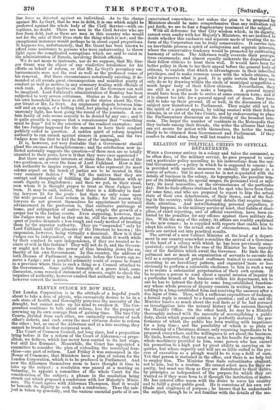ELEVEN O'CLOCK BY BOW BELL.
THE London Corporation is in the attitude of a hopeful youth about to take a dose of physic, who excessively, desires to be in a safe state of health, and thoroughly perceives the necessity of the draught, but cannot make up his mind to swallow it. The Cor- poration continues to talk about reform, less for the purpose of screwing up its own courage than of gaining time. The two City Courts, divided from each other, are eminently conscious of each other's defects, and each owns the most virtuous desire to reform die ether; • but, as one of the Aldermen said at a late meeting, they cannot be trusted to that reciprocal work. The Court of Common Council, not long since, had a proposition ling before it for a reform of the Court of Aldermen' —a propo- sition, we believe, which has never been carried to its last stage, but still lies llormant. Meanwhile, the Court has appointed a committee to consider the plan of extending the municipal fran- chise—one part of reform. Last Friday it was announced in the House of Commons, that Ministers have a plan of reform for the London Corporation, which is to be produced. in Parliament. And new the Aldermen themselves seem to have thought it time to take up the subject : a resolution was passed at a meeting on Saturday, to appoint a committee of the whole Court for the consideration of the subject; a phrase in the resolution being struck out which proposed a -conference with her Majesty's Minis- ters. The Court agrees with Alderman Thompson, that it would be beneath its dignity to seek such a conference. Thus the sub- ject is taken up generally, and the various essential parts of it are
entertained somewhere ; but unless the plan to be proposed by Ministers should be more comprehensive than any indication yet put forth, we are to fear a fragmentary treatment of the subject. With all deference for that City wisdom which, in its dignity, cannot even confer with her Majesty's Ministers, we are inclined to doubt whether this exclusive and separate mode of treating the re- form of the Corporation can be truly conservative. It carries into an inevitable process a spirit of antagonism and separate interests, where the conservative tendency would be promoted by cultivating harmony of action. The Aldermen really overrate their preroga- tives enormously, and almost equally underrate the disposition of their fellow citizens to treat them well. It would have been far better policy in them to lay their appeal before the general body of citizens, to explain that which is advantageous in their inherited privileges, and to make common cause with the whole citizens, in order to preserve what is good. It is quite certain that they can only do so by drawing within the circle of municipal sympathies a much larger body of their fellow citizens. Nevertheless, they are still in a position to make a bargain. A general appeal would have been the mode to arrive at some common term; and if it is almost too late for a general appeal out of doors, they have still to take up their ground, ill or well, in the discussion of the subjeot now transferred to Parliament. They might still act in the spirit of a general appeal, by telring counsel with their fellow citizens, in or out of the two Courts, and by endeavouring to place the Parliamentary discussion on the footing of the broadest inte- rests. The larger the number of residents in the Metropolis that they include among their friends, the wider the alliance that they can yet secure for action with themselves, the better the terms likely to be obtained from Government and Parliament. If they resolve to stand alone, they will but resolve to fall.


























 Previous page
Previous page